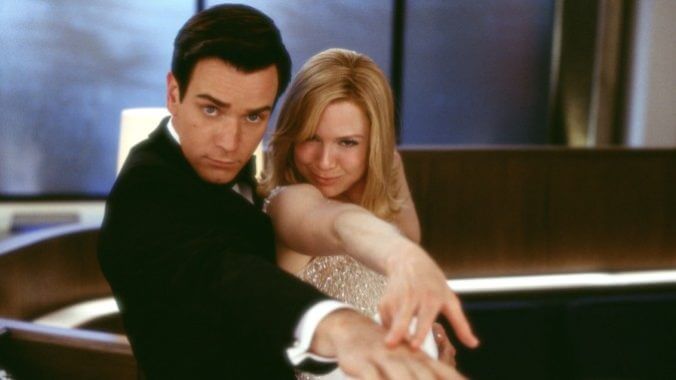Down with Love‘s Searing Satire Was Too Smart to Succeed

Twenty years ago, Warner Bros. dropped The Matrix Reloaded. Perhaps the most anticipated movie of the summer, the first sequel to the 1999 cybersmash was no doubt going to be the number-one movie that weekend. The major studios didn’t even bother with something that could go up against that inevitable box-office behemoth. Well, all except one. 20th Century Fox did release a film that was the complete opposite of the Wachowskis’ futuristic actioner, but no less ambitious. And it was a rom-com!
In Down with Love, Renée Zellweger—already seen as a rom-com queen after starring in the monster-hit adaptation of Bridget Jones’s Diary—plays Barbara Novak, a “farmer’s daughter librarian” from Maine who comes to New York, circa 1962, to publish the titular book. It’s a feminist manifesto that encourages women to break free from the shackles of love (but not sex), so they can be independent girl-bosses. (This includes consuming chocolate.)
When the book becomes a success, she uses her newfound fame to go after charming cads like Catcher Block (Ewan McGregor), a dashing journalist/playboy who stood her up when they had an interview date. As her influence starts to get in the way of his womanizing, he launches a counterattack: He schemes to get Novak to fall in love with him by posing as Major Zip Martin, a chaste astronaut with a Southern drawl. (And, yes, he comes up with the name while he and Novak meet at a dry-cleaning shop.)
Down with Love has to be the ballsiest “chick flick” to come out of the early 2000s. In an age when modern-day, slapsticky love stories were still seen as viable money-makers (a few months before, the Kate Hudson and Matthew McConaughey date movie How to Lose a Guy in 10 Days made over $170 million worldwide), Down with Love dared to take us back to that oh-so-colorful time for rom-coms: The early ‘60s. The movie is a straight-up salute to the Doris Day and Rock Hudson comedies Pillow Talk (which won an Oscar for Best Original Screenplay), Lover Come Back and Send Me No Flowers. But it also gives nods to such kitschy, cinematic meet-cutes as Sex and the Single Girl and That Touch of Mink (which paired up Day with Cary Grant, who headlined a lot of romantic screwball comedies in his prime). As Time critic Richard Corliss wrote in his review, it’s “clogged with specific references to a half-dozen Rock-and-Doris-type comedies that it serves as definitive distillation of the genre.” Even Tony Randall, who played Hudson’s envious sidekick in the Day-Hudson films, does a wink-wink supporting turn as the head of the publishing house.
In a ridiculous but still respectful way, Down with Love sends up those ‘60s “sex comedies” (and the contemporary rom-coms as well) where a man and woman basically mind-fuck and gaslight one another to the point where they realize they’re made for each other. With the sexual revolution just around the corner, ready to put a monkey wrench in a lot of male chauvinists’ plans, Down with Love amps up and ridicules the everyday misogyny and absurd, male-driven paranoia that these films (written, produced and directed by men) flagrantly but fragrantly gave off back then.
-

-

-

-

-

-

-

-

-

-

-

-

-

-

-

-

-

-

-

-

-

-

-

-

-

-

-

-

-

-

-

-

-

-

-

-

-

-

-

-








































